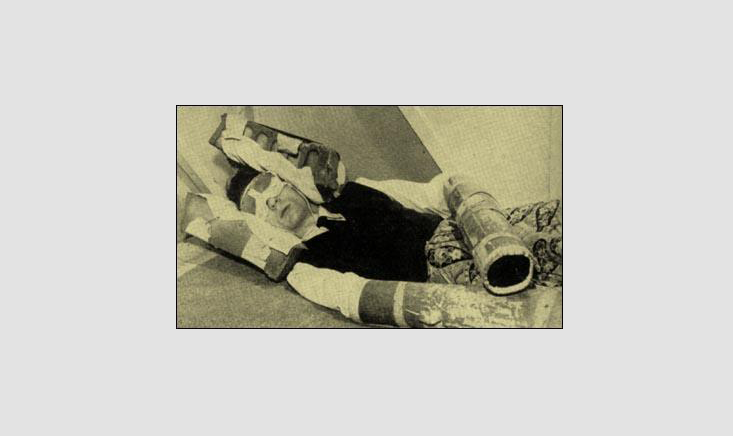Durch weitere Untersuchung sowie weitläufiger Internet Recherche, im Hinblick auf sensorischen Deprivation in Verbindung mit dem Deprivations-Tank oder auch Floating-Tank genannt, bin ich auf weitere Publikationen sowie Studien gestoßen. Darunter fällt ein Buch von Dr. John Cunningham Lilly, mit dem Titel, The Deep Self: Profound Relaxation and the Tank Isolation Technique, welches des öftern auch gerne als Standard-Werk herangezogen wird. Unter anderem, weil John Cunningham Lilly als erster Wissenschaftler versucht hat das Gehirn von nahezu jeglichen Stimuli und Reizen von der Aussenwelt abzuschotten. Des Weiteren ein Buch von Michael Hutchison und Lee Perry, mit dem Titel, The Book of Floating: Exploring the Private Sea und eine Buch von Eugene Jeffrey Gold and Dr. John Cunningham Lilly, mit dem Titel, tanks for the meomories: Floatation Tank Talks.
In diesem Zusammenhang ist mir auch die Arbeit von Previously reported results of sensory-deprivation experiences, of which flotation REST is an instance, were dramatic, generally negative and ultimately unreliable. This book offers controlled systematic research on the effects of flotation REST. The papers in this collection were chosen from those presented at the first three international conferences on REST and fall into several categories. The major category concerns theoretical formulations for REST effects; other categories in the collection deal with experimental findings and clinical research in relation with flotation REST.“ [1]
Zusätzlich sind mir einigen Studien aufgefallen welche Interessanten Fragenstellungen nachgegangen sind. Darunter ein Beitrag der sich genau zu diesem divergenten Thema äussert: Postcard from the Edge of Consciousness: Sensoryy deprivation goes from CIA torture manuals to a yoga studio near you. Nachzu lesen auf der Seite von nautilus. [2] Ich denke es wäre hierbei hilfreich zu wissen was genau Nautilus ist, deshalb hier eine kurze Beschreibung: „Welcome to Nautilus. We are delighted you joined us. We are here to tell you about science and its endless connections to our lives. Each month we choose a single topic. And each Thursday we publish a new chapter on that topic online. Each issue combines the sciences, culture and philosophy into a single story told by the world’s leading thinkers and writers. We follow the story wherever it leads us. Read our essays, investigative reports, and blogs. Fiction, too. Take in our games, videos, and graphic stories. Stop in for a minute, or an hour. Nautilus lets science spill over its usual borders. We are science, connected.“ [3].
Weitere Studien die ich gefunden habe. Kristoffer Jonsson von der Karlstad University Studies von der psychologischen Fakultät Arts and Social Sciences, mit dem Titel Flotation-REST (Restricted Environmental Stimulation Technique) in the age of anxiety-Exploring the role and treatment applications of sensory isolation in the modern world sowie eine weitere Studie von Kristoffer Jonsson zusammen mit Anette Kjellgren, mit dem Titel, Curing the sick and creating supermen – How relaxation in flotation tanks is advertised on the Internet. Ein Artikel welcher durchaus als eine Arbeit oder Teilaspekt einer Master-Thesis gesehen werden kann. Hier ein kurzer Teil des Abstracts: Introduction: Flotation-REST (Restricted Environmental Stimulation Technique) is a complementary and alternative medicine therapy with evidence-based beneficial effects like pain and stress reduction. During flotation-REST a person is lying in a supine position inside a quiet and dark tank, filled with salt water maintained at skin temperature. The water is high in buoyancy, which makes it possible to float comfortably on the back. The method induces deep relaxation through minimization of sensory input. Contemporary scientific findings about beneficial effects resulting from floating have increased the number of private owned floating centers. The aim of this study was to investigate how these centers advertise the benefits of flotation to the public and compare these claims with published scientific evidence. Method: The Google search engine was used to localize web-sites hosting private floating center entrepreneurs. Described effects resulting from floating on these sites were systematically gathered and analyzed thematically. In addition, advertisements were compared to scientific studies on flotation-REST. [4]
[1] https://www.springer.com/de/book/9780387973487
[2] http://nautil.us/issue/27/dark-matter/postcards-from-the-edge-of-consciousness-rp
[3] http://nautil.us/about
[4] https://core.ac.uk/download/pdf/82467487.pdf
